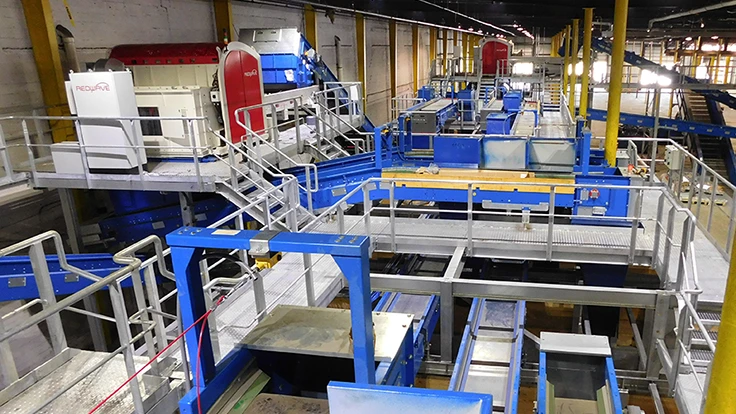
The New York-based Closed Loop Fund, an impact investment fund that makes below-market loans for recycling infrastructure, including household recycling carts, facilities and technologies, has announced its first three investments to bolster recycling infrastructure and reduce cities' spending on landfills.
The initial capital includes $7.8 million from Closed Loop Fund, which helped to unlock an additional investment of $17 million from other public and private co-investors, totaling $24.8 million. The three investments demonstrate replicable economic and environmental returns that recycling can bring to communities across the United States, the fund says.
The first investee is a joint venture between QRS and Canusa Hershman (CHR) to create a plastic recovery facility (PRF) in Baltimore designed to provide a new solution for recycling. The facility is expected to begin operations in October 2015.
Closed Loop Fund ’s two other investments are in Quad Cities, Iowa, and Portage County, Ohio. These investments will allow the two communities to convert from dual-stream recycling systems to single stream, making it easier for citizens to recycle and increasing recycling rates according to the Closed Loop Fund. The potential impact of the two investments is substantial, the consortium says. Over the next 10 years, 37,000 tons of recyclables could be diverted from Portage County landfills, reducing greenhouse gas emission by 110,000 tons. Quad Cities is expected to see 86,000 tons diverted from landfills and greehouse gas emissions reduced by 250,000 tons, the fund says.
The QRS and CHS facility will combine technology to separate Nos. 3-7 plastics and turn them back into raw materials for new products and packaging. The state-of-the-art facility is expected to have the capacity to process 4,500 tons of materials per month and will serve the majority of the U.S. East Coast, according to the Closed Loop Fund.
“We’ve spent months reviewing proposals from cities and recycling facilities that have the potential to transform recycling systems across the country,” says Rob Kaplan, co-founder and managing director of the Closed Loop Fund. “We know that when done right, recycling is a profitable business that can save city and taxpayer money. That’s why Closed Loop Fund invests in business models like QRS-Canusa, Quad Cities and Portage County that solve key bottlenecks in the recycling system, create economic value for cities and make recycling more accessible for citizens.”
“QRS-Canusa’s newest plastic recovery facility in Baltimore provides all communities and recyclers throughout the Northeast and MidAtlantic regions with a reliable, domestic processing solution for mixed, postconsumer plastic containers,” adds Greg Janson, CEO of QRS. “Working in conjunction with other QRS facilities, the Baltimore PRF targets virtually all polymers in the single-stream mix for recovery, returning high volumes of quality material to the manufacturing base. This purpose nests perfectly with the mission of the Closed Loop Fund, and we are excited for their support of the project.”
Founded in 2014, the Closed Loop Fund says it plans to provide cities access to the capital required to build comprehensive recycling programs. The fund aims to invest $100 million by 2020 with the goal to create economic value for cities by increasing recycling rates in communities across America. Fund partners include consumer product, retail and financial companiessuch as 3M, Coca-Cola, Colgate-Palmolive, Goldman Sachs, Johnson & Johnson Family of Consumer Cos., Keurig Green Mountain, PepsiCo and the PepsiCo Foundation, Procter & Gamble, Unilever, Wal-mart and the Wal-mart Foundation.
Investments will be distributed in the form of zero-interest loans to cities and low-interest loans to recycling companies to prove that recycling business models are financially sustainable now into the future, the consortium says.
By 2025, the Closed Loop Fund says it aims to:
- reduce greenhouse gas emissions;
- divert more than 20 million cumulative tons of waste from landfills;
- create more than 20,000 local jobs across the United States;
- save nearly $ 1.2 billion for American cities; and
- prove replicable models that will help unlock additional investment in recycling.
Latest from Recycling Today
- Japanese scrap can feed its EAF sector, study finds
- IRG cancels plans for Pennsylvania PRF
- WIH Resource Group celebrates 20th anniversary
- Ecobat touts commissioning 3 LIB recycling plants in a year
- NWRA: NIOSH cuts a step in the wrong direction
- Novelis announces plant closures
- ABTC reports production increase at LIB recycling facility
- ReMA contributes comments in Commerce Department investigation into copper





